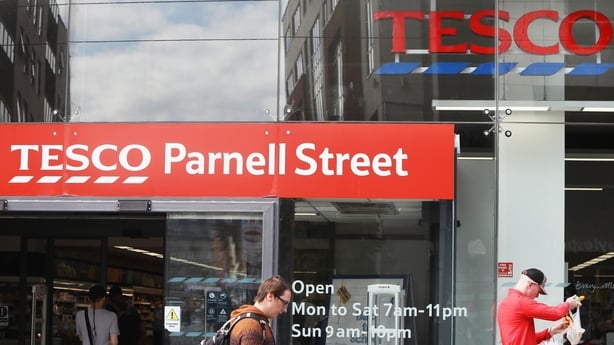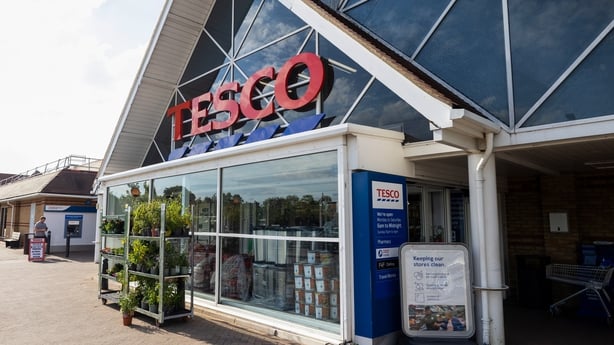Supermarket giant Tesco saw its profit slump last year before tax as the business faced "unprecedented" rises in the prices that its suppliers were charging.
Bosses said Tesco had come under pressure from rising prices as its customers also struggled under soaring inflation.
Pre-tax profit fell from just over £2 billion to around £1 billion in the year to the end of February, Tesco revealed today.
On an adjusted basis, which strips out some one-off costs including a nearly £1 billion charge on property, operating profit dipped 6.9% to £2.6 billion, in line with what analysts had expected.
The profit was hit by a trio of issues, including lower sales volumes, investment in the business and steep cost rises, Tesco said.
"It's been an incredibly tough year for many of our customers, and we have been determined to do everything we can to help," said chief executive Ken Murphy.
"Our results reflect our continued investment in delivering great value and quality for our customers, whilst at the same time looking after our colleagues," the CEO said.
This is despite unprecedented levels of inflation in the prices we have paid our suppliers for their products, and the cost of running our own operations," he added.
But despite problems, Tesco said it had delivered a "market-leading performance" over the Christmas period.
Data from Kantar released in January showed that while Tesco had the largest market share of any supermarket in the UK, it was not the fastest-growing traditional grocer.
Asda's sales grew quicker over Christmas while non-traditional grocers grew even faster.
Tesco also said it had continued to "inflate behind the market" over Christmas, which is thought to mean that it increased prices slower than the competition.
The business said it had taken a £982m hit to statutory profit, largely due to an impairment charge on its assets, mainly its property portfolio which was hit by an increase in discount rates.
Zoe Gillespie, investment manager at RBC Brewin Dolphin, said that Tesco is continuing to cement its position as the UK's top supermarket.
"Profits may be down, but that was to be expected from the pressures of the cost-of-living crisis and post-pandemic normalisation in shopping habits. Sales growth, meanwhile, remains robust and Tesco is well placed to benefit from consumers looking to save on their weekly shop through its different initiatives - particularly its Clubcard scheme," Ms Gillespie said.
"While profits are expected to be flat for the year ahead, the continuation of its share buyback scheme and strong execution of its strategy mean Tesco remains in good shape," she added.
Tesco Irish sales rise by 3.3%
Tesco said its sales in Ireland rose by 3.3% during the year, including growth of 6.6% in the second half as general market inflation increased.
It said it saw a particularly strong Christmas, despite tough comparisons with the previous year when Covid restrictions in the hospitality sector boosted supermarket sales.

Tesco said it grew its market share in Ireland to 22.9% by the end of the year.
Total sales grew by 5.4% at constant rates, including a contribution from the nine Joyce's stores in Galway, which it bought in June and which were fully converted and re-opened as Tesco stores in the third quarter.
Tesco also opened four new convenience stores in Ireland during the year.
"Our continued investment in value through Aldi Price Match, Low Everyday Prices and Clubcard Prices is proving to be a winning formula for customers in Ireland. Clubcard Prices has been a particular success, with sales penetration increasing to 76.5%," it added.
Natasha Adams, the chief executive of Tesco Ireland, said she was pleased with the solid performance of the business over the past 12 months.
"Despite inflationary challenges we saw solid sales growth, particularly in the second half of the year, and we also delivered a very strong Christmas," Ms Adams said.
The Tesco Ireland boss said that customers have responded well to the company's investments in value and price, and this trend has continued into 2023.
"We are seeing continued growth in our online business, more customers are using our Clubcard app, and our nine new stores in Galway are trading ahead of expectations," she added.
Tesco not profiteering amid cost of living crisis - CEO
Meanwhile, Tesco CEO Ken Murphy has today hit back at the suggestion that the supermarket giant is making excessive profits as consumers struggle with a cost of living crisis.
Consumer group Which? and trade union Unite were both critical of the retail profit of £2.49 billion Tesco made in its 2022-23 financial year.
Which? said Tesco should be working harder to make food more affordable for consumers while Unite accused Tesco of "rampant profiteering".
"How can it be that at a time when millions are struggling to feed their families Britain's biggest supermarket is profiteering as never before," Unite general secretary Sharon Graham said.
She was also critical of Tesco's announcement it would buy back a further £750m of shares this year.
But Ken Murphy said the supermarket group was doing a good job for consumers, with its inflation "dramatically below" the headline figure of over 17% reported by market researcher Kantar.
He did not give a figure.

"The key point I'd make is that our profits fell by 7% this year and that is despite the fact that we achieved a record level of cost savings," he told reporters.
"That for me is a very material proof point that we worked very hard for both customers and for colleagues this last financial year," he added.
Murphy said Tesco, which has a profit margin of about 4%, needed to be able to invest in all parts of the business and for all stakeholders - customers, its 330,000 employees, suppliers and shareholders.
"Shareholders have been very supportive, despite a meaningful increase in our top-line sales number, they have seen a significant fall in the profitability of the business," he said.
"They would argue and we would argue very strenuously that we got the balance right this year in making sure that we were very competitive," he added.
Mr Murphy also said he was "very comfortable" with the share buy back as it was balanced with what the group was doing for other stakeholders.
Additional reporting from Reuters

